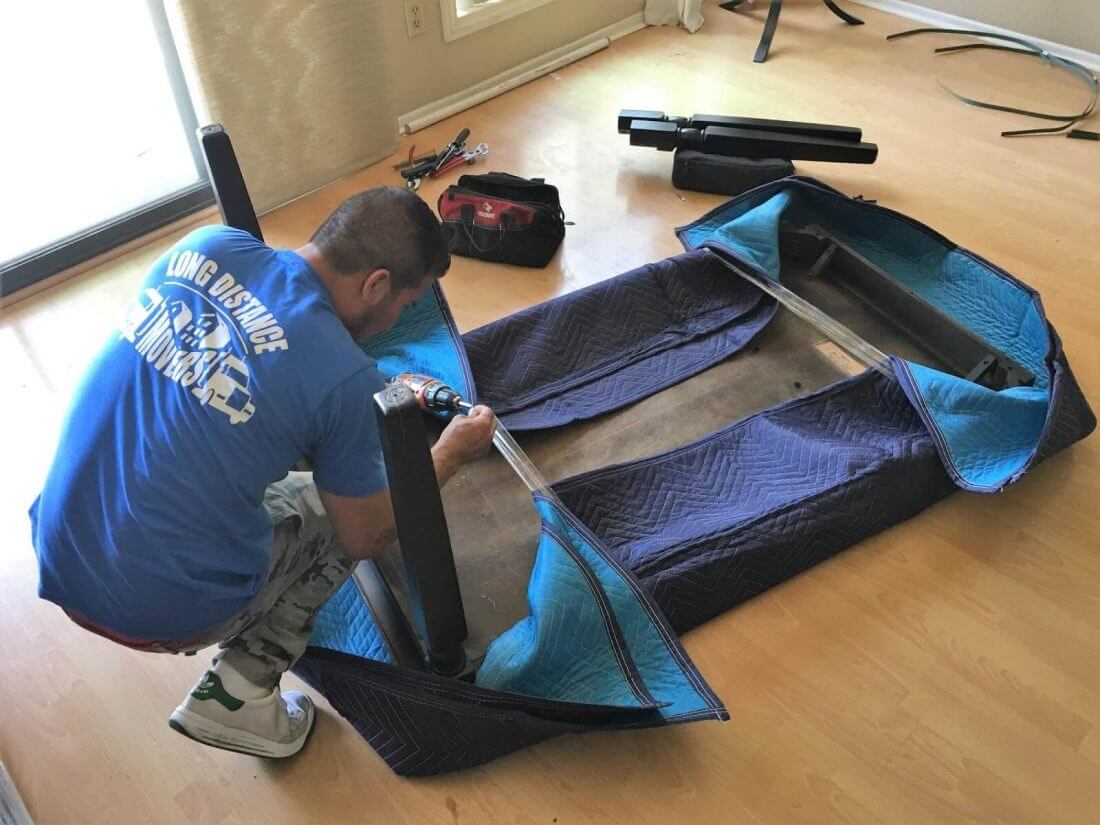If you’re in the process of looking for long-distance moving services for your relocation, you might be overwhelmed by the sheer amount of moving terms you don’t fully understand. To make sure you know exactly what you’re signing up for. To make this easier, we have put together this quick guide to the most important things you should know about.


What Are Moving Terms?
“Moving terms” refer to the specialized vocabulary and jargon used by every professional long-distance moving company, real estate agent, and individual involved in the process of cross-country moving from one home to another. These terms encompass a variety of concepts, from types of relocation services to legal and contractual language found in moving agreements. Understanding these terms is crucial for anyone planning a move, as they appear in quotes, contracts, and during communication with professional long-distance movers.
Common terms include ‘binding estimate,’ which is a fixed cost estimate provided by cross-country movers, ‘bill of lading,’ the official contract between a mover and customer, and ‘flight charge,’ an additional fee for carrying items up or down stairs. By familiarizing yourself with these terms, you can make the move stress-free and ensure a smoother transition to your new home.
Why It’s Important to Get Familiar With These Termonologies?
Getting familiar with moving terms is essential for several reasons. First, it empowers you to communicate effectively with moving companies and understand the services you are being offered. This knowledge helps prevent misunderstandings and ensures that you receive exactly what you expect from cross-country moving services – the guaranteed packing service or the right auto transport option.
Secondly, understanding these terms can significantly aid in comparing quotes and services from different providers, ensuring you get the best deal while avoiding potential hidden costs. Additionally, familiarity with moving terminology can protect you legally and financially.
By understanding the details of your relocation contract, such as insurance coverage, liability, and delivery timelines, you are better equipped to advocate for your rights and make informed decisions throughout the moving process.
Ultimately, knowing these terms enhances your control over the moving experience, contributing to a smoother, more predictable transition to your new home.


Moving-Related Terms
Organizing a relocation means you need to put hiring cross-country movers on your to-do list. But, once you start organizing the whole process, you’ll see there is quite a bit of terminology related to corporate and household relocation services you should be aware of. Here are the most important and most common words and phrases.
Interstate and Intrastate Relocation
These two terms have to do with the starting location and the final destination of a move. If you are relocating within your state, we’re talking about an intrastate relocation. If, however, you are relocating across the state border, that is an interstate move.
Moving Inventory
An inventory is a comprehensive list of all household goods scheduled for shipment, as well as the condition and contents of boxes. It’s a must since 73% of all moved items are inside of your house.
Actual Cash Value
If an object gets damaged, broken, or stolen during shipment, its ACV is calculated. This is the cost of replacing or repairing the object.
Air Freight
This is a service providing the shipment of goods via aircraft. It is usually only used for international moves.
American Moving & Storage Association
A.M.S.A. is an organization dedicated to maintaining the high quality of shipment services provided by relocation companies in the country.
Auxiliary Service
Also called the shuttle service, it is needed when a shipping truck can’t access the desired destination due to, for example, narrow roads. In such cases, a smaller vehicle is used and charges for auxiliary services are added to the overall cost.
Bill of Lading
This is a document that serves as a contract between the movers and the client, as well as a receipt for the relocation solutions.
Carrier
Sometimes, moving companies call themselves carriers. Some other names you might stumble upon include moving experts, relocation companies, movers, or removal companies.
Expedited Service
If you are relocating on a tight schedule and need to do it as soon as possible, you should request expedited services. Keep in mind that they come at an additional cost.
Impracticable Operations
These are conditions that make it impossible for movers to do their job with their usual equipment. If special equipment or more staff is required, there may be additional charges.
Estimated Weight
The approximate overall weight of all the household goods being shipped.
High-Value Article
These are household goods for which the estimated value exceeds $100 per pound of weight. Such items need to be listed on a separate form.
Stair Carry Charges
Stair carry charges, also known as flight-carry charges are charges added to the overall price if the movers need to carry items up or down a flight of stairs between your home and the truck.
Storage-in-Transit
If your new home isn’t move-in ready, you can use the storage facilities provided by the movers. However, you may be additionally charged for storage-in-transit.
Non-Allowables
These are goods that relocation companies aren’t allowed to transport. These include items such as flammable chemicals, illegal goods, weapons, pets, plants, or perishable foods. Contact your chosen relocation company for a more detailed list of non-allowed items.
Car Shipping Service Terminology
When planning to ship your four-wheeler, understanding car transporting service terminology is crucial. This specialized vocabulary encompasses the terms and phrases used by professional relocation and auto transport companies to describe the services they offer, the processes involved, and the policies governing these services. Here are some terms you should familiarize yourself with as well.
Open Carriers
These auto carriers are most commonly used in car shipping. They are trucks where the vehicles loaded for shipment are exposed to weather conditions and road debris.
Enclosed Carriers
These carriers fully protect a vehicle from the elements during the shipment. They are more expensive and are usually reserved for show cars, luxury four-wheelers, or race cars.
Door-to-Door and Terminal-to-Terminal Delivery
Your car may be picked up from and delivered to your front door, or it may be dropped off at the nearest terminal for you to pick up. You choose the mode of delivery based on your preferences. While door-to-door delivery is more convenient, terminal-to-terminal delivery may save you some money.
Delivery Network
This is a network of routes and terminals used by auto carriers for the shipment of vehicles all across the country. When you’re working with professionals such as Long Distance USA Movers, you’ll get all the needed info before the moving day, so you won’t have to worry about a thing.
Whether you’re shipping a classic car, a family sedan, or a luxury vehicle, being well-versed in terms like “door-to-door delivery,” “terminal-to-terminal transport,” and “enclosed auto transport” can significantly influence your decisions and expectations. Get to know the essential terminology used in car shipping because it will help you navigate the logistics of auto transport with confidence and clarity.


Packing Terminology
Navigating the intricacies of moving involves more than just understanding how to transport items from one place to another. It also requires a grasp of packing terminology. This set of terms includes the different types of materials and methods used to protect your belongings during transit and prevent them from breaking. Here are some words and phrases you should know.
Bubble Wrap
A pliable, transparent plastic material used for packing fragile items. It consists of numerous small air pockets that provide cushioning and protect against impacts during transit.
Packing Peanuts
Small, lightweight foam pieces, used to fill empty spaces in packing boxes. They prevent items from shifting and absorbing shock during movement.
Full-Service Packing
A service offered by moving companies where they handle all aspects of packing your belongings. With Long Distance USA Movers it also means we’ll deal with your belongings if more than 15 boxes are needed. We’ll securely pack each item, ensuring professional handling and safety.
DIY Packing
Stands for “Do-It-Yourself” packing, where you take on the responsibility of buying packing materials and wrapping and boxing all your belongings. This option can be more cost-effective but requires significant time and effort.
Stretch Wrap
A highly stretchable plastic film that is wrapped around items to secure them during transit. It keeps items tightly bound and protected from dirt and moisture.
Wardrobe Boxes
Tall cardboard boxes with a metal hanging bar across the top, designed for transporting hanging garments. These boxes allow clothes to be moved directly from closet to box without folding, minimizing wrinkles.
Furniture Pads (or Moving Blankets)
Thick, padded blankets are used to cover furniture and large items to prevent scratches, dents, and dust during the move
Dish Pack (or Dish Barrel)
A sturdy, double-walled box specifically designed for transporting dishes, glasses, and other kitchenware. These boxes typically come with cell dividers to isolate each item and provide additional protection.
This will break down the essential vocabulary related to packing, providing you with the knowledge to choose the best packing options for your needs and ensuring your belongings arrive at their new home in perfect condition.


Miscellaneous Terminology
Beyond the straightforward terms associated with packing and shipping, the moving process encompasses a variety of miscellaneous terminology that can significantly affect your moving experience Here are some additional terms in the relocation industry you are likely to stumble upon.
Agent
An agent is an affiliated removal company that is authorized to act on behalf of the one you hired. Some of the things an agent may do include booking, pickup and destination services, or pretty much anything else. Agents are usually local companies that act on behalf of national ones.
Brokers
Unlike an agent, a broker is not an actual relocation company. This is a company that intermediates between movers and clients. They offer relocation services to clients and pair them with available truck drivers.
Binding and Non-Binding Estimates
Whether it’s for moving or car transport, you will likely be dealing with price estimates, also known as quotes. A quote is an approximate price of the services you would like to receive that a relocation company calculates based on the information you provide. A binding estimate is given upon an onsite survey and comes in the form of a flat price. A non-binding quote, on the other hand, may be subject to change.
Tariff
A tariff is a document containing all the rules and rates of a relocation company. You could say it is the Terms of Use of the relocation industry.
How Can Hiring Reliable Relocation Crew Help in This Journey?
Hiring a reliable relocation crew can significantly enhance the moving experience in several crucial ways. Surely, the most important is expertise and efficiency. professional movers bring a level of expertise that ensures all aspects of the move are handled efficiently. They have the skills and experience to pack items securely, manage logistics, and handle heavy and delicate items safely, reducing the risk of damage.
Auto Transport
Move your car across the country in an open or enclosed trailer – for an affordable fee. We offer car transport as a standalone service, but you can bundle it with your household move and get a hefty discount.
Learn morePacking Service
Sit back and relax, we’ve got packing services covered. We use moving blankets, shrink wrap, bubble wrap and even custom wooden crating. Your stuff will be protected and carefully handled during the move.
Learn moreStorage Services
Our spacious climate-controlled units will protect your things until the drop-off. No need to worry about them because all items are labeled and secure, and each customer gets a dedicated unit mixup isn’t possible.
Learn moreStress Reduction and Time Savings Are the Top Reasons Why Hire a Professional Relocation Team
Moving can be a stressful endeavor with many moving parts. A reliable crew takes on the burden of packing, loading, transporting, and unloading, allowing you to focus on other important aspects of your relocation, such as settling into your new environment or managing work and family responsibilities.
Professional movers are trained to complete the moving process quickly and effectively. This means that the physical moving of your belongings happens faster than if you were to attempt it yourself or with unskilled help, freeing up your time for other necessary tasks.
Proper Equipment and Materials
A professional moving crew comes equipped with the right tools and materials for the job. This includes heavy-duty lifting equipment, furniture pads, and the appropriate packing materials to protect your belongings during transport.


Understanding Moving Terms – Key to a Successful Relocation
Understanding the various terms used in the moving process is crucial for a smooth and stress-free relocation. From packing your belongings with the utmost care to choosing the right car shipping service, being familiar with moving terminology allows you to navigate the logistics efficiently and confidently. Knowing these terms will help you communicate effectively with service providers and ensure that your possessions are handled properly. Ready to embark on your moving journey? Contact Long Distance USA Movers today for expert guidance and top-notch moving services that cater to your needs. Let us help make your next move a seamless and successful experience






